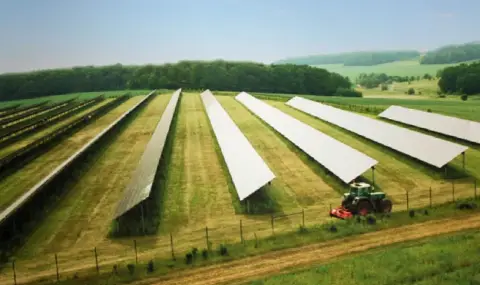One of the famous startups in Ireland in the field of energy and technological solutions decided to invest in Bulgaria and Montenegro. Thanks to special software, the viability of each plot of land for solar park development can be assessed. It combines legal, geospatial and up-to-date energy market data to simplify the process of identifying, evaluating and acquiring solar farm sites.
What are the advantages for the Bulgarian and how can he profit from his own land? He answers these and other questions in an interview for the largest real estate site imot.bg.
Solsign is a unique platform that uses special technology to assess whether land is viable for renewable energy projects. The portal combines legal, geospatial and up-to-date energy market data to simplify the process of identifying, assessing and acquiring utility-scale solar farm sites. Solsign provides exclusive access to Europe's largest database of pre-screened, viable land for solar, ensuring unparalleled access to prime development opportunities.
How is the viability of each plot for setting up a solar park determined?
Solsign has developed a proprietary algorithm that thinks like a solar developer. The algorithm “knows” the most important parameters for a solar developer when they are looking at land - its size and shape, how flat it is, the type and classification of the land, what is the irradiance in the area, what are the planning risk in the area, the proximity of the site to a nearby substation and more. We have all this data - some of which is publicly available (such as geospatial data) and some of which we developed ourselves (such as the network route map). The algorithm takes all this data and crunches everything into a number - we call it “the Solsign score” which ranges from 0-100 - the higher the score, the more suitable the land is for a solar site.

What pre-inspection steps are needed for any plot where an investor intends to build solar panels?
This part differs from developer to developer. Some developers are only interested in grid connectivity - they try to locate a place where they think there might be availability in the grid to connect a new power plant, and then look for land in the surrounding area. Not all of those developers actually manage to find the right land for the price they were thinking of, and it might result in them losing the connectivity permit or selling their right to connect to other developers who already have the land. Others think more long term and prefer to sign pre-agreements (also known as option or exclusivity agreements) with as many landowners as possible so when there is a future availability in the grid (in any location) they can submit an application with the TSO or DSO as they are required to demonstrate (as part of the process) that they have a suitable land for the project. Solsign can help these two types of developers, however we put more emphasis on helping developers build pipelines for the long term.
Can you explain the consultation process between investors and landowners when establishing a solar park?
Our platform features hundreds of land polygons throughout the Balkans. All these lands are “hot leads” meaning that the landowner is willing to listen to offers from solar developers. Most of these landowners don’t know anything about solar or what a solar project entails in terms of the process or the commercial terms. When a developer that has signed up to use our platform sees a land that they like and believe has good potential for solar development, they ask us to facilitate the meeting with the landowner. Our country manager is present in this meeting and helps to mediate between the developer and the landowner - each coming from a different world and view. It is important to note that we do not interfere with the negotiations. The parties are free to decide for themselves the terms of the transaction. We’re just here to help bridge the gap between both sides.
What factors guide your recommendation to investors regarding the land — whether to sell it, offer it under concession, or pursue alternative options?
We respect the unique business models of each investor and don’t get involved in their processes. Each developer has their own way of doing business - some prefer to acquire the land and some prefer to lease it for a long term. Most of them will opt to enter into a pre-agreement with the landowner to allow them to develop the solar site on the land, and only if they obtain all the permits they will acquire or lease the land, as agreed with the landowner. In addition, some developers build the project and operate it during its lifetime while others prefer to reach the RTB (ready-to-build) stage and then sell the project. Because each developer works differently, and developers differ from one another in regard to their risk appetite, we don’t interfere with their processes. Our roleis to bring lands and give the developer all the information they require to make an informed decision about the project’s potential.
You work throughout Europe. While southern regions may be more appealing for solar park development in Europe, what other essential factors must a plot possess?
The first thing to consider is the size and shape of the plot. It needs to be large enough to allow sufficient installed capacity of solar panels in accordance with the project plans, and its shape needs to allow for maximal utilisation of the space. Other important parameters are the slope (the flatter the better), lack of natural obstructions (such as mountains or woods that can cause shadowing) and good exposure to sun in terms of irradiance and sunhours. Other very important factors are proximity to supporting infrastructure such as power lines and substations but also access roads. We have all this data and more and that allows us to find the best possible available plots for solar farms.
Given Bulgaria's fertile land, what proportion of it is suitable for solar park installations?
This point is a bit painful since as things currently stand you can only develop solar farms in Bulgaria on agricultural lands which are classified as least productive (types 7-10). There was an attempt to allow development on type 6 classification land which is currently on hold. While agriculture is very important and we need to protect those fertile plots that can produce good yields, the government must do more to balance the need for farming on the one hand, with the need for clean and cheap energy on the other. One way to do that is by developing a framework for agri-solar farms. These types of projects allow for the erection of solar panels between and on top certain crops, allowing the same land to be used for both agriculture and electricity production. We believe that it is only a matter of time before we see more of these projects in Bulgaria as well and that will also mean that a large proportion of Bulgaria’s land could be used for both agriculture purposes and renewable energy ones.
Which regions within Bulgaria offer optimal conditions for solar park construction?
Bulgaria in general has a good distribution of sun radiation so technically speaking, and leaving legalities aside, most of Bulgaria has good conditions for solar parks. The main issues are, like anywhere else, two: (1) permitting processes which usually differ from area to area because they take into account local implications and (2) electricity infrastructure which often can’t support new grid connections, especially in the more remote and rural areas. However, these problems are present almost anywhere in Europe and we know that both the EU and local governments spend a lot of money in tackling these issues. We can already see some improvements but it will take time.
What specific factors led you to choose Bulgaria as your focus area at this time?
Since the start we were focused on the Balkans. We launched in Serbia and from there we expanded into Montenegro, Slovenia and now Bulgaria. We, but also our customers - the energy companies, believe that there is great potential in Bulgaria and the rest of the Balkans and we expect to see Bulgaria’s renewable energy market booming in the next few years. The reasons are varied - not only good natural resources but also huge investments by EBRD and the EU that are sure to attract foreign investors in the years to come. Yes, there’s still a long way to go and governments must invest more in supporting infrastructure as well proper legislation but we have no doubt in our minds that it will happen, and sooner than later.
You can see detailed statistics on average property prices in Bulgaria by cities and neighborhoods HERE
